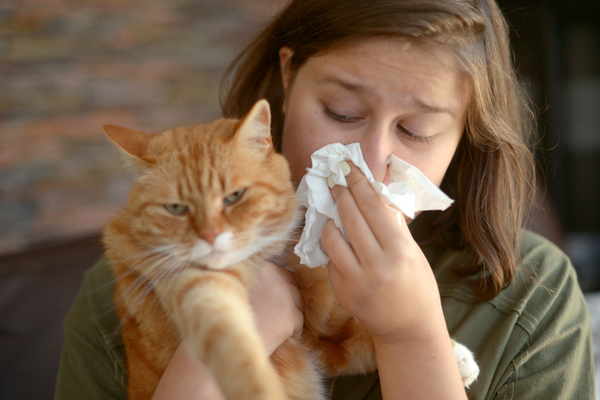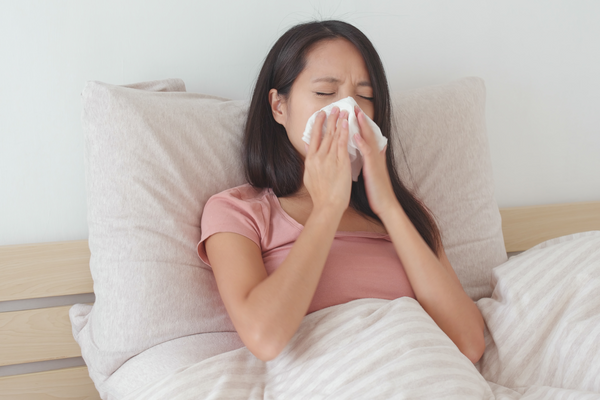Have Pets? Consider Ditching These Chemicals

As responsible pet parents, we do our best to give our animals the best lives possible. We feed them high-quality food, keep them entertained with plenty of outdoor activities, delicious treats, and engaging toys. We protect them from harmful annoyances like fleas and ticks, schedule annual vet checkups, and even brush their teeth. However, there’s one factor that many pet guardians don’t consider when it comes to their animal care routine – and it’s arguably one of the most impactful: avoiding exposure to harsh household chemicals. We can all do our best to keep our cleaning supplies locked up, and our toilet lids closed, but it’s still possible that our beloved pets will be exposed to harmful substances due to our cleaning routines. Even some of the pet care products we use regularly are often loaded with harsh chemicals. There is a better way.
Alarmingly, there is little information in the mainstream pet community about the effects of the harsh chemicals found in everyday household cleaners, laundry detergents, and pet shampoos on the health and well-being of our pets. According to the American Veterinary Medical Association (AVMA), nearly 50% of dogs over the age of 10 will develop canine cancer. Sadly, one in five cats will develop cancer in their lifetime. As pet parents, we can take so many actions to try and prevent cancer in our beloved companion animals. These include staying on top of vet checkups, feeding a healthy diet, minimizing sun exposure, spaying or neutering, keeping pets at a healthy weight, and avoiding exposure to harsh chemicals.
The reality is, most store-bought cleaners, air fresheners, and pet shampoos are riddled with harsh chemicals, endocrine disruptors, carcinogens, and neurotoxins that are not only harmful to us – they are arguably more damaging to our pets. When we use harsh products like bleach, ammonia-based cleaners, heavily-fragranced disposable mop pads, and air fresheners, the chemicals these products contain are dispersed into our environment. These harsh chemicals present throughout our homes will be inevitably absorbed through our pet’s paws, collected on their fur, and ingested during their daily grooming routines. Skin rashes, coughing, wheezing, headaches, and mild allergic reactions can often be attributed to the harsh chemicals found in many commercial household products. Sometimes, a buildup of these chemicals in your pet’s body will manifest as symptoms that mimic common food allergies. Concerned pet parents rush to the store to switch their pet’s diet – when they really should be ditching certain chemicals in their homes.
Important Safety Note: If you suspect your pet has been poisoned (symptoms may include vomiting, diarrhea, lethargy, and seizures), seek veterinary medical help right away. Call a local emergency vet for advice and determine whether they should see your pet. If they are not immediately available for advice, call the ASPCA Animal Poison Control Center at (888) 426-4435.
Specific Ingredients to Avoid
While you’d never knowingly expose your four-legged friends to harmful substances, thousands of household products contain harmful – even potentially deadly – ingredients. Thankfully, we can help make our pet’s environments safer and much less toxic by being just a little more conscious. When shopping for household products, it’s best to try to avoid the following ingredients:
Ammonia
Ammonia is a ubiquitous ingredient in household products, often found in window cleaning formulations and oven cleaners. It’s also an irritant to the mucous membranes.
Bleach
Chlorine bleach is a noxious respiratory irritant that can damage pets’ skin, eyes, or other membranes. Studies have also found that the faint smell of bleach can cause animals to go nose blind, which is equivalent to humans losing their sense of sight. Once an animal goes nose blind, they lose their ability to navigate and understand their surroundings, creating a fear-filled environment.
Bleach can be found in all-purpose cleaners, disinfecting wipes, dishwashing detergents, tile scrubs, toilet-bowl cleaners, laundry detergents, and mildew removers.
Formaldehyde
You’re probably thinking, “Of course, I wouldn’t use a product that contains formaldehyde in my home.” Unfortunately, manufacturers know that no one would knowingly purchase a bottle of dog shampoo with “formaldehyde.” on the ingredient list. However, derivatives of formaldehyde can be known by a variety of other names, for instance:
- Diazolidinyl urea
- DMDM Hydantoin
- Formalin
- Imidazolidinyl urea
- Sodium hydroxymethylglycinate (SHMG)
According to the American Cancer Society, even when formaldehyde isn’t used in certain household products, “substances that release formaldehyde” could be.
Parabens
Parabens are a cheap and effective preservative commonly used by the cosmetics industry to prolong product shelf life and stop creams and shampoos from developing bacterial growth and mold. Given the various scientific studies on parabens, many people opt to use paraben-free products for themselves and their pets. In pet products, parabens are often found in dog shampoos. Parabens can cause skin irritation, rashes, skin infections, and endocrine disruption in humans and pets. Alarmingly, parabens also mimic estrogen. A 1980s study on paraben sensitivity in dogs suggested that its usage on female pooches drives males wild and stimulates arousal when the females are not in heat. Check your pet’s products for methyl, ethyl, propyl, and butyl parabens to avoid this nasty ingredient.
Sulfates
Sulfates are chemicals that manufacturers use as cleansing or foaming agents. Many household products include sulfates, including foaming cleaners, toothpaste, and shampoos. Sulfates provide the sudsy texture that occurs when a person mixes a product, like pet shampoo, with water. Brands will tell you that they use sulfates (aka detergents) in pet shampoo because, in addition to making the product sudsy and the fur sleek and shiny, they capture oil and dirt that washes out in the rinse. What they don’t tell you is while the sulfates are removing excess oil and dirt, they are also stripping the natural oils and irritating the skin, causing redness, drying, and itching, sometimes leading to skin infections.
Not to mention, some of the byproducts of sulfates, such as 1,4-dioxane, Sodium Laureth Sulfate (SLES), and ammonium laureth sulfate, are all known cancer-causing agents. California’s Proposition 65 list of chemicals known or suspected to cause cancer or congenital disabilities includes 1,4-dioxane. The Environmental Protection Agency (EPA) has listed 1,4-dioxane as a likely human carcinogen, with the potential to cause nasal and liver tumors. Noncarcinogenic effects include effects on the nervous system, liver, and kidneys. 1,4-dioxane can also enter the natural environment through waste streams such as wastewater treatment plants, landfills, and manufacturer waste streams.
Sulfates can be listed under a few different names. Here’s what to look for (and avoid) on product labels:
- Sodium Lauryl Sulfate (SLS)
- Sodium Laureth Sulfate (SLES)
- Ammonium Lauryl Sulfate (ALS)
- Ammonium Laureth Sulfate (ALES)
- Sodium Coco-Sulfate (SCS)
P.S. If you use shampoo with sulfates, be very careful around your pet’s eyes. SLS has been linked to the development of cataracts, and in young pets, SLS may even cause permanent damage to the protein formation in the eyes, leading to blindness. Overall, it’s best to choose a sulfate-free shampoo for your pets, and yourself for that matter.
Synthetic Fragrance
Artificial fragrances – found in multi-purpose cleaners, laundry detergents, air fresheners, candles, soaps, pet shampoos, and other synthetically scented products – often contain chemicals that are dangerous for pets, including heavy metals, phthalates, and volatile organic compounds (VOCs). Devastating health effects consistent with long-term exposure to these chemicals include respiratory problems, skin irritation, heart disease, reproductive complications, and cancer. Sadly, these chemicals are prevalent. In 2008, the Environmental Working Group (EWG) published the Polluted Pets report, the first study of its kind, to give the public a better understanding of the chemicals affecting our pets’ health. The EWG’s research concluded that American pets are loaded with harsh chemicals found in artificial fragrances. Specifically, they reported that dogs were contaminated with traces of phthalates at levels up to 4.5 times higher than humans, and cats were contaminated at levels higher than in any of the over 5,500 people tested by the Centers for Disease Control and Prevention (CDC).
To avoid these harmful chemicals, the best way to start is by reducing the exposure in your home. Begin by spring cleaning your household products, and rid your cupboards of any products that include “fragrance” in the ingredient list.
Related: What’s That Smell? Avoid These Big Bad Chemicals Found in Common Household Cleaners
Switch to The Ecology Works’ Eco-Friendly & Pet-Friendly Pet Products

At The Ecology Works, we strive to be a leader in products that are better for people, pets, and the planet. Demonstrated by our plant and mineral-based Anti-Allergen Pet Shampoo that’s produced in a 100% solar-powered manufacturing plant, the 100% biodegradable formulas of our Anti-Allergen Solution and Anti-Allergen Laundry Detergent, and Vital Oxide, our all-in-one cleaner, stain and odor remover, sanitizer, and disinfectant that’s formulated without harsh chemicals, we are actively working towards safe and environmentally-sound cleaning and disinfecting solutions that enhance the quality of life for people and pets. Our products are free from bleach, ammonia, formaldehyde, sulfates, and synthetic fragrances.
Have questions about cleaning or reducing harsh chemicals in your home? We have answers! The Ecology Works has been leading the way in green cleaning since 1993. We can help you select the products you need to live a better, allergen-free life. Please feel free to Contact Us or message us on Facebook. No question is too small! We're here to help.





